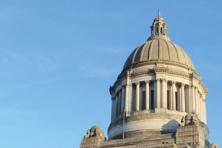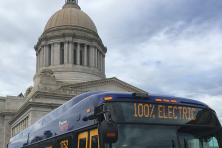In Olympia this year, sixty days came and went. Despite legislators considering measures that would make serious progress on climate action, our State Senate Democratic majority failed to get the job done, and in doing so they helped protect the oil industry’s monopoly for another year. Now I know there are any number of Senators that won’t appreciate the characterization and were sincerely ready to cast good climate votes, but the planet doesn’t give points to good intentions. We either cut carbon or temperatures rise, and our Senate did not cut carbon.
Senate Democrats allowed the most significant policy proposal this year—the Clean Fuel Standard—to again languish in the Transportation Committee. But it took several years of advocacy for the legislature to finally do the right thing and pass 100% clean electricity last year, and we’ll be coming back for the Clean Fuel Standard too. We are grateful to the 45 House and Senate Democrats who signed letters (House and Senate) describing the Clean Fuel Standard as a precondition for any future transportation revenue package. We acknowledge and appreciate your commitment, and we look forward to working with you and our grassroots champions to pass both in a future session. It is eminently reasonable to say that Washington should not invest in new road projects without a mechanism for cutting pollution from them.
There were a number of smaller wins to celebrate:
ZEV Mandate: This piece of unfinished business from (believe it or not) the 2005 legislative session will have Washington join 11 other states (and growing!) that will require automakers to provide Washington consumers with options for competitively priced zero emission vehicles. Car buyers in our state have shown a greater interest in electric vehicles than in any other state outside of California, despite being denied some of the more interesting new models. This policy, spearheaded by Senator Joe Nguyen, will help transform our auto market and increase consumer choice. The policy is likely to ratchet up gradually over the years, requiring increasing sales over time—if the Trump Administration doesn’t yank the rug out from under states trying to clean up their air.
Gas Pipeline Leakage Prevention: When gas utilities lose natural gas into the air, it’s still you that picks up the bill, not them. While they are required by law to maintain their pipeline system to safety specifications, this has not always gone according to plan. Moreover, they’re not required to disclose volumes and causes of their lost gases to anyone (some limited data is available through 2013 on the Washington Utilities and Transportation Commission’s website as the utilities report data to federal regulators; but it’s difficult to find, outdated, incomplete, varies wildly year to year, and appears to be unreliable). The situation is extraordinarily bad for consumers, but it’s also terrible for the climate, as fossil gas is composed almost entirely of methane—a potent greenhouse gas. Representative Sharon Shewmake sought to address these gaps, and her new law will require gas companies to annually disclose their leaks, including calculations of the amount of gas they intentionally vent into the air, helping ensure that those emissions can be tracked, prevented and repaired.
Climate Emission Limits Update: After years of delay, Washington adopted into law some of the most ambitious, science-based pollution limits of any state in the country. Representative Vandana Slatter’s bill is a necessary policy that updated our targets to 95% greenhouse gas emission reduction by 2050 and net-zero emissions at the same time. The new law centers forest sequestration as part of our state’s strategies to achieve these goals, and sets the intention to design future policies with worker impacts in mind. The updated limits are thoughtful and well-crafted, but they are not binding. Passing this bill puts in sharp relief the state’s failure to meaningfully decarbonize our economy. (See note above about the value of good intentions.)
These are good steps forward, but they’re not good enough. Climate change is bearing down, and the fossil fuel industry is profiteering on our peril. Our legislature shouldn’t help that happen.
Image

What happened to our climate leadership?




